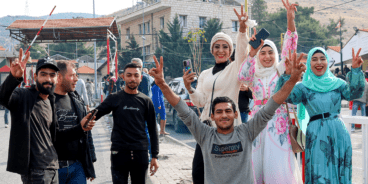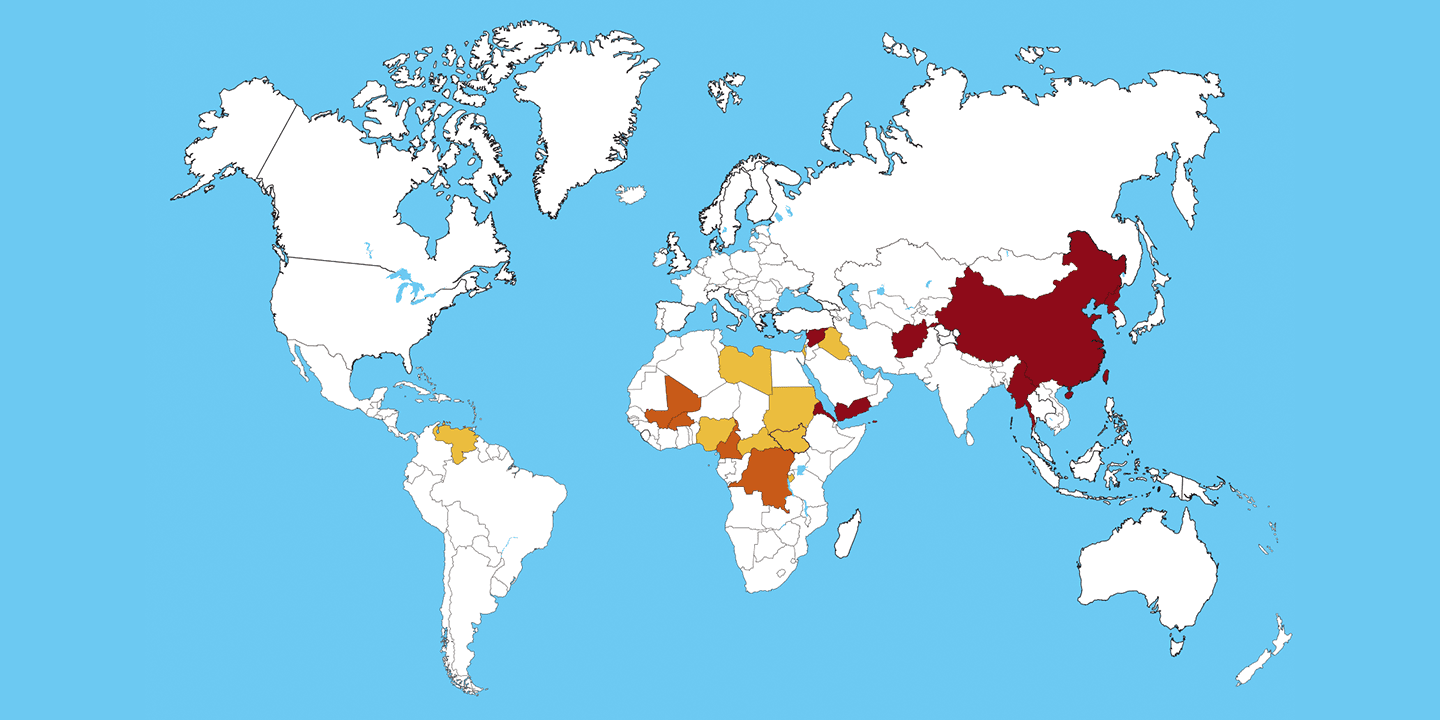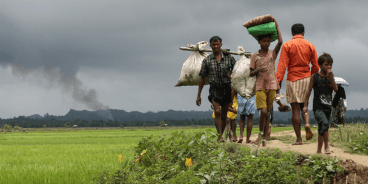

R2P Monitor, Issue 49, 15 January 2020
R2P Monitor is a bimonthly bulletin applying the atrocity prevention lens to populations at risk of mass atrocities around the world. Issue 49 looks at developments in Afghanistan, China, Myanmar (Burma), Syria, Yemen, Cameroon, Democratic Republic of the Congo, Mali and Burkina Faso, Central African Republic, Iraq, Libya, Nigeria, South Sudan and Venezuela.
Highlights include:
Current Crisis
Afghanistan
From December 2018 to September 2019 a US government delegation engaged in talks with the Taliban in an effort to end their 18-year war in Afghanistan. However, as an agreement was being finalized, the Taliban launched attacks in Kunduz, Baghlan and Kabul, killing 94 civilians. The US cancelled further negotiations, but US Special Envoy Zalmay Khalilzad resumed talks during December. Since September Afghan security forces and the US military have escalated operations against the Taliban, who have also increased their attacks and bombings in civilian areas. The UN Mission in Afghanistan reported that there were more civilian casualties in Afghanistan between 1 July and 30 September than in any other three-month period in the past ten years, with 1,174 civilians killed and 3,139 wounded.
China
Approximately one million Uighurs and other Turkic Muslim minorities are currently being detained in “re-education” or “de-extremification” facilities in China without formal charges, due process, or access to legal representation. Systematic discrimination against the Uighurs, as well as surveillance systems that target the group, increases their vulnerability to violations and abuses of their fundamental human rights.
Myanmar (Burma)
More than two years since the government launched so-called “clearance operations” in Rakhine State, populations in Myanmar remain at risk of mass atrocity crimes perpetrated by the security forces and as a result of discriminatory laws and policies. Since August 2017 an estimated 720,000 people – the majority of the Rohingya population – have been forced to flee, bringing the total number of Rohingya refugees in Bangladesh to over 900,000 people. In its September 2019 report, the Human Rights Council-mandated Independent International Fact-Finding Mission on Myanmar concluded that Myanmar “continues to harbor genocidal intent” towards the Rohingya. On 11 November The Gambia, on behalf of the Organization of Islamic Cooperation, filed a lawsuit with the International Court of Justice, accusing Myanmar of violating its obligations under the Genocide Convention.
Syria
Since the Syrian crisis began in 2011 the conflict between the government and opposition groups has escalated into a civil war in which at least 560,000 people have been killed. The escalation of fighting in Idlib and adjoining portions of Aleppo and Hama governorates – the last remaining opposition strongholds within Syria – since April puts populations at ongoing risk of mass atrocity crimes. The Office of the UN High Commissioner for Human Rights (OHCHR) has confirmed over 1,300 civilian deaths, including over 300 children, since the launch of the offensive, nearly all of which are attributable to Syrian government and Russian forces. In addition, on 9 October Turkish military forces launched “Operation Peace Spring” against the Syrian Democratic Forces (SDF) and the Kurdish People’s Protection Units (YPG), which the Turkish government regards as a terrorist organization. Since the start of the invasion there have been widespread civilian casualties as a result of airstrikes, attacks on civilian objects, summary executions and other violations that may amount to war crimes committed by Turkish forces and affiliated non-state armed groups.
Yemen
Despite diplomatic efforts to end Yemen’s four-year war, populations remain at risk of war crimes and are experiencing the largest humanitarian crisis in the world. Despite the December 2018 “Stockholm Agreement” and the ceasefire in Hodeidah largely holding, there were almost 800 civilian casualties in Hodeidah during 2019 and hostilities have intensified elsewhere, particularly in Al-Dhale, Hajjah, and Taiz governorates, as well as Aden.
Imminent Risk
Cameroon
Populations in Cameroon are at imminent risk of potential atrocity crimes due to the ongoing crisis in the Anglophone regions and military operations against the armed extremist group, Boko Haram. Since October 2017 at least 650 civilians, 235 members of the security forces and nearly 1,000 alleged separatists have reportedly been killed as a result of armed conflict.
Democratic Republic of the Congo
Several provinces in eastern DRC – notably North Kivu, South Kivu, Ituri and Tanganyika – have been plagued by recent inter- communal violence and attacks by armed groups. A government offensive against the Allied Democratic Forces (ADF) armed group, launched in October 2019, has prompted a serious of reprisal attacks targeting civilians.
Mali and Burkina Faso
Since 2015 Islamist armed groups have expanded their activities from northern to central Mali, prompting the formation of ethnic militias and armed “self-defense groups” in many communities. The porous border between Mali and neighboring Burkina Faso has facilitated the expanded activities of Islamist armed groups throughout the region, dramatically increasing the number of attacks in Burkina Faso in the past couple of months. According to the UN Office in West Africa and the Sahel, during 2019 at least 4,000 people were killed in terrorist attacks in Mali, Burkina Faso and Niger.
Serious Concern
Central African Republic
Despite the signing of a peace deal during February 2019, ongoing fighting amongst armed groups in CAR leaves civilian populations at risk of attack.
Iraq
Mass protests across Iraq against unemployment, poor public services, corruption and the government’s sectarian quota-based system have been ongoing since 1 October 2019. While suppressing the protests, Iraqi security forces have utilized disproportionate and deadly force, resulting in at least 500 deaths and over 15,000 serious injuries.
Libya
On 4 April Field Marshal Khalifa Haftar ordered his self-proclaimed Libyan National Army to launch an offensive against the UN-backed Government of National Accord based in Tripoli. At least 287 civilians have been killed and over 150,000 displaced since April. Additional fighting broke out in Murzuq, resulting in at least 45 civilians killed and thousands displaced.
Nigeria
Recurring inter-communal violence in the “Middle Belt” region and ongoing attacks by Boko Haram continue to threaten populations in Nigeria.
South Sudan
Despite a September 2018 peace agreement, the risk of recurring armed conflict between government forces and armed rebel groups continues to pose a threat to civilians in South Sudan. Since the signing, there have been severe delays in implementing crucial components of the R-ARCSS, including the reunification of the armed forces, the demarcation of state borders, and the establishment of a Transitional Government of National Unity.
Venezuela
Since President Nicolas Maduro took office during 2013, popular discontent with the government has led to widespread protests. The government has routinely responded to mass protests with disproportionate and deadly force as well as the mobilization of auxiliary militias, so-called “colectivos.” The Venezuelan government has reported that 6,856 people have been killed in “security operations” since January 2018.
During January 2020 the Democratic People’s Republic of Korea and Eritrea were also listed as Current Crisis situations, while Burundi, Israel and the Occupied Palestinian Territories, and Sudan were listed as Serious Concern situations, but were not featured in the print edition of the R2P Monitor.
Related Publications


Statement on the developing situation in Syria
